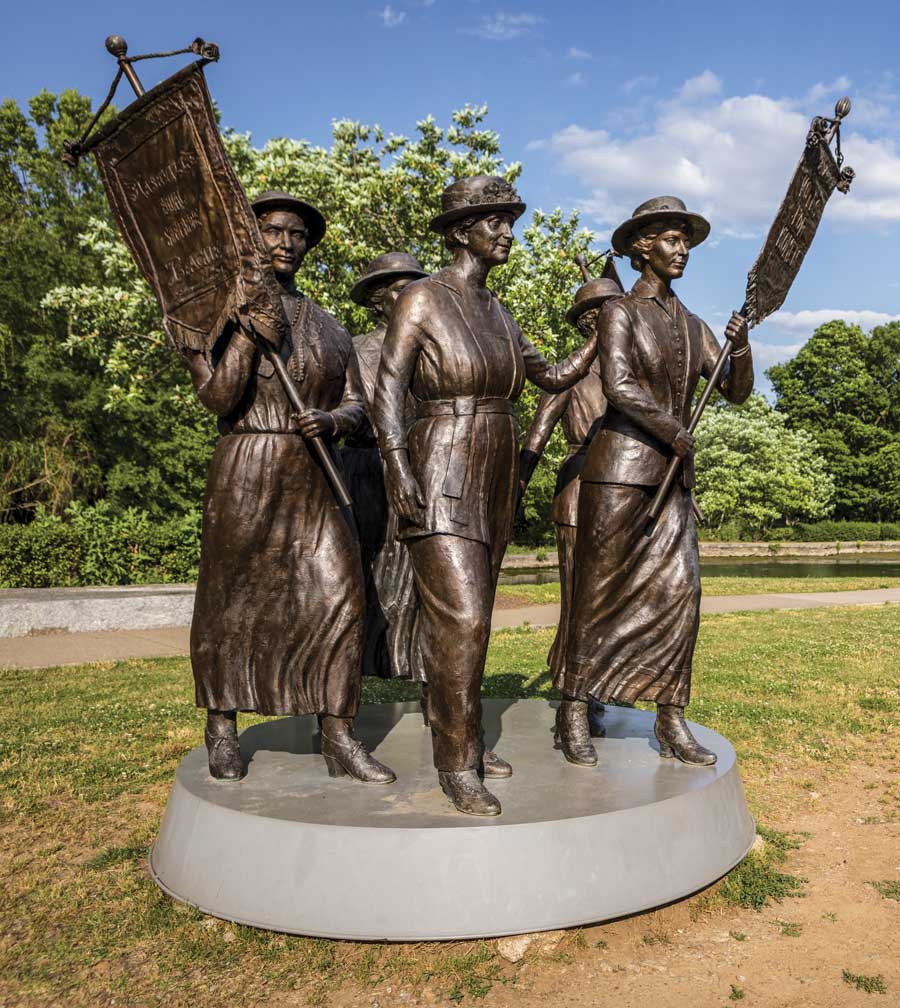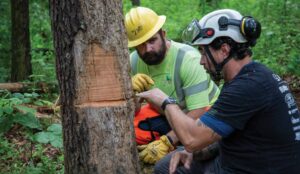The 19th Amendment to the U.S. Constitution was approved by Congress on June 4, 1919 but it took more than a year for the measure granting women the right to vote to gain ratification by 36 states. On Aug. 18, 2020, the nation marks the centennial of this human rights milestone.
Illinois – the fight to be first
According to the Sangamon County Historical Society, some women had been advocating for the right to vote since the 1860s but the efforts of Grace Wilbur Trout and her non-confrontational style helped create a statewide suffrage campaign in Illinois. Trout toured the state to encourage other women to join the cause. She worked with many suffragists including Jane Addams, well-known for her formation of Hull House and a Nobel Peace Prize recipient. The two lobbied Illinois legislature members long before the passage of the 19th amendment.
In 1913, Illinois was one of the first states to grant women the right to vote for president and at some local levels, making it the first state east of the Mississippi to do so. However, they still couldn’t vote for statewide or federal offices.
The fight continued with the efforts of numerous women from across the state including journalist and black abolitionist Ida B. Wells who worked to engage black women voters.

June 4, 1919 was a momentous day for those fighting for full suffrage. Congress needed 36 states to ratify the amendment and Illinois fought to be the first.
According to the Springfield Daily Illinois State Register, it took those in the Prairie State less than an hour to ratify the amendment. The Senate vote was unanimous while the House vote had three dissenters.
Later that day, both Wisconsin and Michigan also ratified it. According to Dave Joens, director of the Illinois State Archives, because of a typo in the papers from Washington, Illinois had to redo its vote the next week, making Wisconsin the first to ratify.
It took until mid-August for Tennessee to become the 36th state to ratify, pushing the amendment over the required number to make it law, just in time for the presidential election.
Women’s voices in rural America
Rural America was built and owes much of its success to family-run farms and businesses. While fathers and husbands are often celebrated throughout history, wives and mothers have been full partners in creating thousands of communities. Numerous women were Illinois electric cooperative incorporators and board members. In fact, electric cooperatives have served as incubators for the leadership skills that guide co-op-served communities today.
Power and partnership
“Historically, rural wives were always isolated and only had interaction with their husbands and children, but they helped run farms and ranches, and ran their homes,” says Betsy Huber, president and CEO of the National Grange.
Founded in 1867, the Grange chapters took root as fraternal community organizations committed to promoting sound agricultural concepts in the north, south and the expanding west.
“From the beginning, women could hold any office in the Grange,” says Huber. “We have 13 offices, including four that are only open to women.”
By the early 1900s, organizations like the Grange were providing rural women with meaningful leadership opportunities and fueling passions for full engagement in public life that included political participation.

With the rise of suffragist sentiments in the early 20th century, the Grange routinely included women in governance decisions, says Huber. “One of our national agriculture committees early in the last century had six members, including three men and three women, who reviewed and discussed the resolutions submitted by local Grange chapters that ultimately set policy for the National Grange.”
Among the farm women embracing the suffragist cause was Febb Ensminger Burn, a widow from Tennessee’s McMinn County, who played a decisive role in earning women the right to vote and changing U.S. history.
“Suffrage has interested me for years,” Burn once told a reporter.
Between running her farm and caring for her family, she followed news accounts from Nashville and was turned off by harsh opposition speeches against ratification in summer 1920. In August, she penned a letter to her son, Henry T. Burn, a freshman representative in the House of the Tennessee General Assembly.
“Vote for suffrage and don’t keep them in doubt,” wrote Burn to her 24-year-old son. “Don’t forget to be a good boy and help.”
With the letter from his mom in his pocket, Rep. Burn broke a 48-48 deadlock by changing his vote to pass the measure, and women nationwide were guaranteed the right to participate in national elections.
“I spend a lot of time encouraging co-op members to contact their legislators, and mother-son influence is a great example of true grassroots activism,” says Amanda Wolfe, an NRECA senior political advisor.
The area where Burn once farmed and raised her family is still served by Volunteer Energy Cooperative, says Wolfe, adding that voters there are still inspired by the state’s role as being the 19th Amendment’s “Perfect 36”—a reference to its decisive ratification role.
“Voting is more than just a right, it is a privilege,” says Wolfe. “The suffragists fought for generations to finally win that privilege 100 years ago, and every time we cast a ballot, we honor their memories.”
Fueling cooperative change
When electric cooperatives were organized years later, many of the same principles honored by rural organizations, including recognition of property rights, were among the fundamental tenets included in co-op charters. Family memberships were vested in heads of households, regardless of gender, and women were among the founding members of many electric cooperatives.
When President Franklin D. Roosevelt created the Rural Electrification Administration in 1935, farm magazines published stories about the news. Maye Shaw of Quitman, Texas, was a former teacher and regular reader who knew life on the farm would be easier with electricity.
She wrote Rep. Morgan G. Sanders for information and persuaded her husband Virgil to look into it. By 1937, both were riding through the surrounding countryside recruiting members. Mr. Shaw eventually became the founding general manager of Wood County Electric Cooperative, which now serves nearly 36,000 meters and still headquartered in Quitman.
“Though it was men who signed their names to charter Taylor EMC [in 1937], women have played a
vital role in the cooperative’s development and success,” wrote authors of a 75th anniversary book on the history of Flint Energies. The Georgia-based co-op, originally founded as Taylor Electric Membership Corp., has enjoyed an active female membership since its early days.
Beulah Taylor and Ruby McKenzie became the cooperative’s first female board members in 1938 and helped lead the co-op through its formative years.
“Homemakers living in rural Taylor County spurred the cooperative’s early membership growth,” wrote authors. “Eager to bring the benefits and conveniences of electricity to their homes and farms, they held neighborhood meetings and took applications to further the cooperative cause.”
In 1939, when the Rural Electrification Administration approved its first loans for electric cooperatives in South Carolina, women were actively involved in the formation of Darlington-based Pee Dee Electric Cooperative.
Carrying the torch of cooperative leadership
Since the early days of Illinois cooperatives, women have been involved in a variety of aspects including signing up members, serving as co-op directors and handling many duties at the cooperatives – including as managers. These talented and knowledgeable CEOs currently include Marcia Scott, Tri-County Electric Cooperative, Mt. Vernon; Laura Cutler, M.J.M. Electric Cooperative, Carlinville; Alisha Anker, Menard Electric Cooperative, Petersburg; Tamara Phillips, Norris Electric Coopertive, Newton; and Amy Borntrager, Coles-Moultrie Electric Cooperative, Mattoon. Well-respected for their wealth of knowledge, insight and commitment to members, they carry the torch for those who came before and those yet to come.







